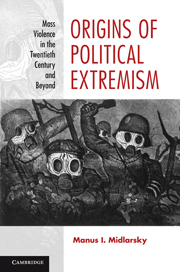Book contents
- Frontmatter
- Contents
- List of figures and tables
- Preface
- Introduction
- PART I Theory and Empirics
- PART II The Secular “Isms”
- PART III An Ostensibly Sacred “Ism”
- PART IV Extreme Nationalism
- 9 Sri Lankan Tamils
- 10 Poland
- 11 The Balkans
- 12 The Rampaging Military
- 13 Variations in Genocidal Behavior
- PART V Conclusion
- References
- Index
10 - Poland
Published online by Cambridge University Press: 05 June 2012
- Frontmatter
- Contents
- List of figures and tables
- Preface
- Introduction
- PART I Theory and Empirics
- PART II The Secular “Isms”
- PART III An Ostensibly Sacred “Ism”
- PART IV Extreme Nationalism
- 9 Sri Lankan Tamils
- 10 Poland
- 11 The Balkans
- 12 The Rampaging Military
- 13 Variations in Genocidal Behavior
- PART V Conclusion
- References
- Index
Summary
An especially egregious case of murderous ethnic cleansing will now occupy our attention. Why does ethnic cleansing, and especially this particular case, deserve study as an example of political extremism? It is simply because the goal of a Poland free of its Jewish population, enunciated by nationalist extremists like the National Democrats and National Radical Camp as early as the beginning of the interwar period, came to fruition after World War II. This is an egregious case because the earlier massive persecution of Jews by the Nazis was now to be revisited by Poles, albeit in much attenuated form. If ever there appeared to be a case where extremist behavior should have been tempered by compassion for the victims, this was a prime candidate. Yet this was not the case. Why?
Post-war anti-Semitism in Poland
One of the striking features of the post-World War II period is the emergence of a murderous anti-Semitism in Poland. Between 500 and 1,500 Jews were killed by Poles in the immediate post-war period. The Jews who had barely survived the war either as inmates of Nazi concentration camps, hidden by Polish gentiles, or escaped to the Soviet Union, were now returning to Poland. In virtually all cases, they had experienced devastating family losses in addition to their own extraordinary personal hardships.
- Type
- Chapter
- Information
- Origins of Political ExtremismMass Violence in the Twentieth Century and Beyond, pp. 208 - 218Publisher: Cambridge University PressPrint publication year: 2011

